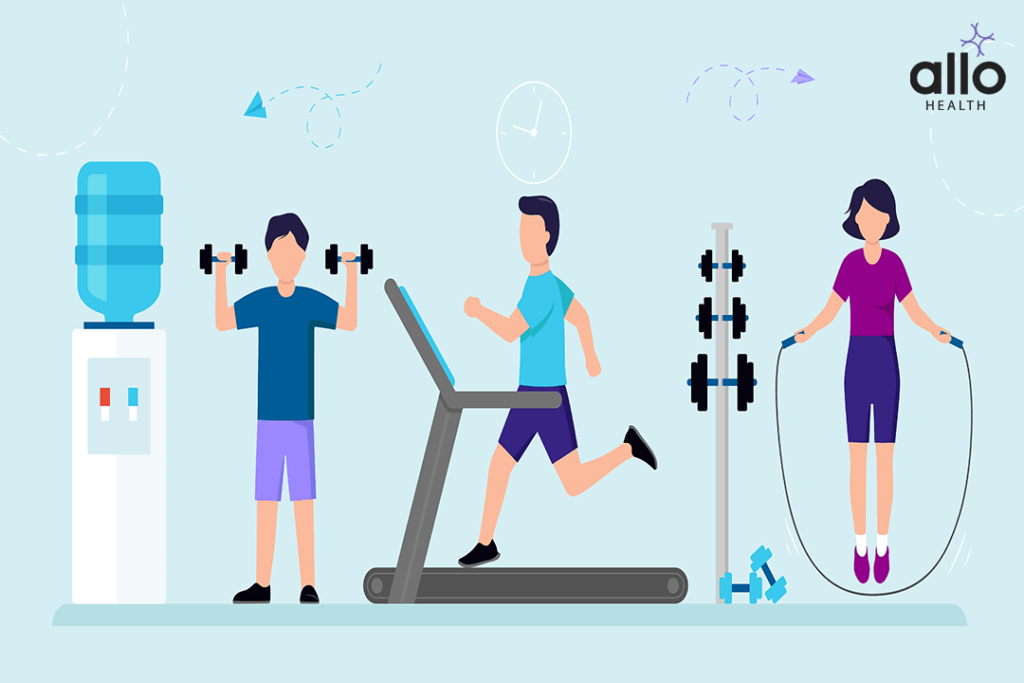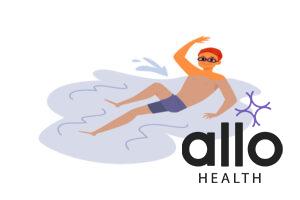Erectile Dysfunction Exercises

Allo Health is dedicated to personalized well-being, offering support and trusted information tailored to individual health goals. The platform emphasizes human-generated content, led by a distinguished medical team of experts, including physicians and sexual health specialists. Their commitment to credibility involves rigorous fact-checking, authoritative research, and continuous updates to ensure accurate, up-to-date information. Allo Health's unique approach goes beyond conventional platforms, providing expert-led insights and a continuous commitment to excellence, with user feedback playing a crucial role in shaping the platform's authoritative voice.

A Psychotherapist with Clinical specialization, working for over seven years now. Areas of specialization range from Anxiety-related disorders, Mood-related disorders, Personality disorders, Sexual dysfunctions & other mental health issues.
Why This Was Upated?
Our experts continually monitor the health and wellness space, and we update our articles when new information became available.
Updated on 10 June, 2024
- Article was updated as part of our commitment to diversity, equity, and inclusion.

"The following blog article discusses exercise and its potential benefits for general health and well-being. However, it is important to understand that the information provided is for general educational purposes only and should not be considered as personalized exercise advice or a substitute for professional guidance from a qualified fitness professional or healthcare provider. Before starting or modifying any exercise program, it is recommended to consult with a qualified fitness professional.
Book consultation
The information presented in this article may not be suitable for everyone, as individual fitness levels, health conditions, and limitations can vary significantly. A qualified fitness professional can assess your specific fitness needs, consider any medical concerns or limitations, and provide personalized recommendations and exercise plans that are safe and effective for you.
Participating in physical activity, including exercise, carries inherent risks. It is crucial to listen to your body, exercise within your personal limits, and be aware of any signs of discomfort or potential injury. If you experience any pain, dizziness, shortness of breath, or other concerning symptoms during exercise, it is important to stop immediately and seek medical attention if necessary.
The exercises or activities mentioned in this article may not be suitable for individuals with specific medical conditions, injuries, or physical limitations."
Lifestyle factors can greatly contribute to can affect sexual health and, sexual dysfunctions or sexual disorders – diet and physical activity is important for physical health – such as your cardiovascular health or heart health, blood vessel health, blood pressure levels, blood sugar levels and metabolic health – all of which in turn can greatly impact your overall health and sexual functioning. As per sexual wellness experts, there are ways to help prevent ED symptoms.
When it comes to diet and exercise or physical activity, however, many are unaware of how it correlates with sexual dysfunctions such as Erectile Dysfunction. Here are ways that you can understand the correlation and implement these lifestyle habits.
The following exercises help strengthen the muscles around the genital area. This helps the penis in not only obtaining an erection but also by maintaining it.
Exercises for Erectile Dysfunction

Pelvic Floor Muscles exercises
These help with strengthening the pelvic floor muscles. Most commonly done by women to help regain muscle tone after child delivery, they also help with sexual wellness.
Kegel exercises, a type of pelvic floor training, can particularly help improve the strength of the pubococcygeus (PC) muscles and the penile muscles. These types of exercises help improve incontinence, manage medical conditions such as prostatitis and BPH, and of course, increase male sexual pleasure by helping men have greater control over ejaculation and orgasm.
Kegel exercises that you can perform:
- Laying on your back
- Laying on your side
- Sitting down
- Standing up
In either of these above positions, squeeze the muscles around your anus – as though you were controlling a bathroom trip. Hold the squeeze for at least 5-8 seconds before releasing. You can repeat this up to 10 times per day.
Aerobic exercises

Aerobic activity such as brisk walking or jogging are examples of aerobic or cardio exercises — this means that they help in cardiovascular conditioning. They help in keeping the blood vessels clear, and so, can improve one’s sexual function and sex life.
MSDs (male sexual disorders) such as ED, are commonly caused by problems with the blood flow to the penis. Factors such as diabetes, high cholesterol, or concerns in weight management leading to obesity, can affect blood flow and lead to ED symptoms. Aerobic exercises help in all these conditions and improve sexual functioning.
As per a research paper, 40 minutes of aerobic exercise (moderate to vigorous) and 160 minutes of weekly exercise (of any type) for 6 months can help reduce erectile problems when with ED.
While exercises – aerobic and pelvic floor exercises – are highly recommended as a lifestyle modification while dealing with ED, it is important to remember that overdoing exercises can also stress the body which can lead to the worsening of ED symptoms. Listen to your body, and don’t push your limits.
- Aerobic exercises include dancing, water aerobics, biking, walking, hiking, kick-boxing, treadmill, elliptical, etc. – essentially anything that gets your heart pumping.
- Pelvic Floor Exercises include heel slides, Happy Baby Pose, diaphragmatic breathing, etc.
Pilates exercises
Pilates help with ED because they challenge your pelvic muscles strength. Besides penile and prostate health, Pilates is greatly beneficial for erectile function.
Pilates exercises that you can perform:
- Knee fallouts
- Supine foot raises
- Pelvic curl
Exercising can greatly improve physical health – including cardiovascular, blood vessel and blood flow help. It helps prevent chronic conditions such as cardiovascular disease, kidney diseases, blood pressure concerns etc – all of which can help with an improvement in erectile functioning among patients with erectile dysfunction. If you have an increased risk factor for ED – we encourage you to perform Kegel and pelvic exercises at home – it’s about 30 minutes of your time a day.
A healthy lifestyle is imperative for sexual functioning, even though it is commonly ignored. Physical inactivity is discouraged as it adds to the common risks associated with ED.
Things To Remember While Exercising
If it is your first time exercising, we suggest that you speak to a trainer. However, the exercises mentioned above are not injurious to health. If you have exercise related injuries or any joint injuries, we recommend speak to your doctor for any related health concerns before starting any physical activity regimen.
- Listen to your body, pace yourself
- Don’t overindulge in physical equipment, you can run the risk of an injury
- Make sure you’re always in a comfortable position: nothing should hurt in strength training
- Be consistent in your works, making a schedule can help
- Track your progress to encourage you to continue
- Always eat and drink well while starting a work-out regiment (maintain healthy diet)
- If you experience pain, breaks, or injuries, stop immediately and see a doctor
Frequently Asked Questions
Q: Will exercise cure erectile dysfunction?
A: Exercise or any lifestyle changes are an important part of erectile dysfunction treatments. High intensity aerobic training, flexibility training, high-intensity endurance training, pelvic floor muscle exercises all help with complete erectile function in patients with ED.
Q: Can exercise worsen erectile dysfunction?
A: No, exercise can’t worsen erectile dysfunction to will help you maintain a health weight. If you’re unable to exercise everyday, low intensity movement is also recommended by experts. Besides catering to a healthy lifestyle, exercise can work simultaneously with medical treatments to help with effective treatment. Daily exercise routines can change your life.
Q: What are some exercises for male erectile dysfunction?
A: Some exercises that may help with male erectile dysfunction include pelvic floor exercises (Kegels) to strengthen the muscles that support erections, aerobic exercises like brisk walking or jogging to improve blood flow, and yoga or relaxation techniques to reduce stress and anxiety, which can contribute to ED. It’s essential to consult a healthcare professional before starting any exercise regimen for ED.
Q: What are the treatment options for Erectile dysfunction?
A: Treatment options for people with erectile dysfunction (ED) include oral medications like Viagra or Cialis to enhance blood flow, lifestyle changes such as diet and exercise to improve overall health, and therapies like penile injections or vacuum erection devices. In more severe cases, surgical options like penile implants may be considered. Consulting a healthcare professional is crucial to determine the most suitable treatment approach.
Q: What are the symptoms of erectile dysfunction?
A: Symptoms of erectile dysfunction (ED) include difficulty achieving or maintaining an erection during sexual activity and reduced sexual desire or libido. These symptoms can cause stress, anxiety, and relationship issues.
Q: Does a healthier lifestyle improve sexual dysfunction?
A: Yes, adopting a healthier lifestyle, including regular exercise, balanced diet, and avoiding harmful habits, can improve sexual dysfunction by enhancing blood flow, hormone levels, and overall physical and mental well-being.
Q: Can I substitute exercises with erectile dysfunction pills?
A: While exercises may improve erectile function in some cases, they generally cannot fully substitute erectile dysfunction pills. Medications like Viagra or Cialis directly enhance blood flow to the penis, providing more immediate and reliable results compared to exercises alone. It’s essential to consult a healthcare professional to determine the most appropriate treatment plan for individual needs.
Q: Can stress cause ED?
A: Yes, stress, including job stress, can cause erectile dysfunction (ED) as it triggers the release of stress hormones that can disrupt the normal blood flow to the penis, leading to difficulty in achieving or maintaining an erection. Other stresses such as relationship issues, financial worries, and performance anxiety can also contribute to ED.







































